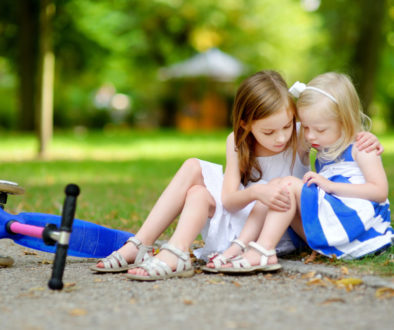Developing Early Empathy Skills in your Toddler

Empathy is key to a child’s current and future success, happiness, and well-being. Unfortunately, the importance of empathy is widely underestimated in our society, so it is not always placed at the top of the priority list among various parenting styles and techniques. To empathize with someone is to understand what they may be feeling or, more specifically, to understand what you would feel like if you were in a similar situation. While we are born with the capacity for empathy, it does not happen automatically; Empathy develops over time with exposure, experience, and practice.
The best way for a child to learn empathy is by watching us and experiencing the way we show empathy for them. It is important to remember that attachment is necessary for building empathy; safe, secure attachment happens when we show empathy toward our children first.
Here are a few ways to help your child build their empathy skills:
- Start by empathizing with your child aloud – Let your child know that you understand how they may be feeling. “You didn’t want to leave the park yet. It’s frustrating to have to stop playing before you feel ready. I can see that you feel sad.”
- Talk about how others may be feeling – Create dialogue with your child about other’s emotions that they can observe. “Maria fell and scraped her knee. She got hurt and feels sad.”
- Use pretend play to describe emotions – Play is how children learn best. Concepts become more concrete when children can use play to learn. “How do you think bear feels?”
- Be a role model. When you have strong, respectful relationships and interact with others in a kind and caring way, your child learns from your example.
- Use “I” statements. When you communicate with a focus on how you feel, it models the importance of self-awareness. “I don’t like it when you hit me. It hurts.”
- Validate big emotions. As parents, we often want to take away big emotions when our child is sad, angry, or disappointed. We want to fix things because we don’t want our children to experience negative feelings. However, these feelings are part of life and when we support our children by labeling and validating difficult feelings, we actually help them learn to handle the big emotions. “You are really mad that we can’t go outside. I understand. You love playing outside in the yard. It’s okay to feel mad. When you are done being mad you can choose to help me make a yummy snack or play in the kitchen while mommy makes something to eat.” This can help children learn to empathize with others who might experience difficult feelings by modeling how to validate emotions in the moment.
- Re-think “I’m sorry.” We often want our toddlers to say “I’m sorry” as a way for them to make amends for their actions. But toddlers don’t have the capacity to fully understand what these words mean. A forced apology may feel “right” for them to say, it doesn’t necessarily teach toddlers empathy. A more impactful approach may be to support children in recognizing how the other person may be feeling: “Sarah, look at Roger – he looks sad. He’s crying. He’s holding his arm where you hit him with the toy. Let’s see if he is okay.” This helps children make the connection between the action (hitting with a toy) and the reaction (a friend who is sad and crying).
- Be patient. Developing empathy takes time. It is a skill that must be learned and practiced. Toddlers and young children are generally egocentric; it is very normal for a toddler to focus on me, mine, and I. Keep in mind, empathy is a complex skill and will continue to develop throughout your child’s lifetime.
- Open a book. Reading is another great way to support a child’s learning! Here are a few books on feelings and empathy that you can read to your child to help them understand about different emotions. Here are a few recommendations:
- The Way I Feel by Janan Cain
- I Am Human: A Book of Empathy by Susan Verde
- Today I Feel Silly: And Other Moods That Make My Day by Jamie Lee Curtis
Remember, parents are children’s first and most influential teachers. Simply modeling empathetic behavior is one of the best ways a parent can teach their child this essential skill.





